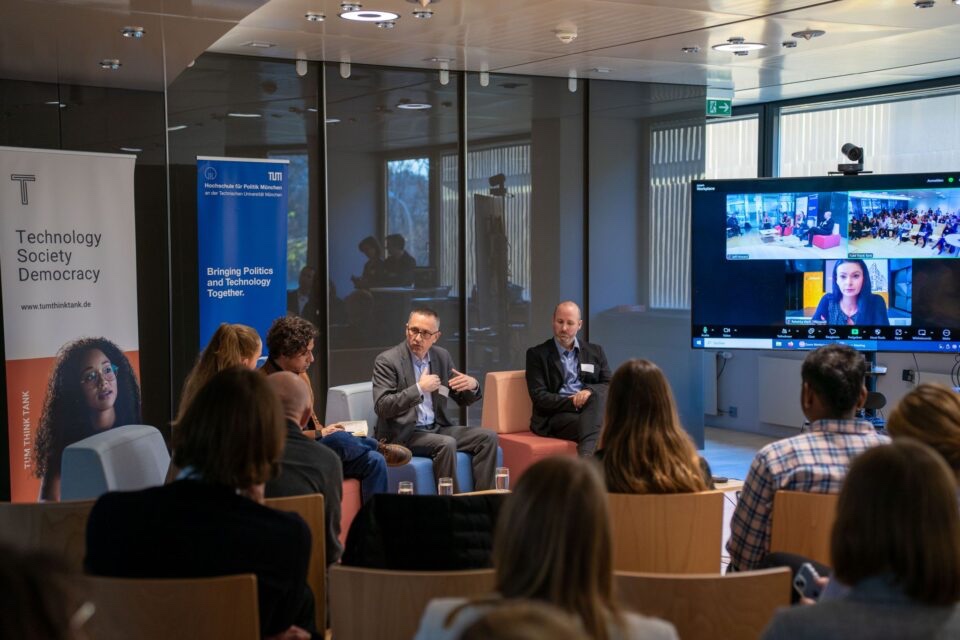
Empirische Forschung zu Inhaltsmoderation, Plattformen und Meinungsfreiheit
Förderung evidenzbasierter Forschung zu digitaler Kommunikation und Plattformgovernance, um sicherere und demokratischere Online-Räume zu gestalten.
Das Content Moderation Lab untersucht, wie digitale Plattformen Online-Äußerungen regulieren – und wie sich diese Entscheidungen auf das Verhalten der Nutzer:innen, die öffentliche Meinung und die demokratische Teilhabe auswirken.
Basierend auf praxisnahen Daten und länderübergreifenden Perspektiven schlägt das Lab eine Brücke zwischen Forschung und Politik, um eine transparentere, inklusivere und verantwortungsvollere Inhaltsmoderation zu fördern.
Sie sehen gerade einen Platzhalterinhalt von YouTube. Um auf den eigentlichen Inhalt zuzugreifen, klicken Sie auf die Schaltfläche unten. Bitte beachten Sie, dass dabei Daten an Drittanbieter weitergegeben werden.
Mehr InformationenÜber das Lab
Online-Kommunikation ist zentral für das demokratische Leben und dennoch wird heftig darüber gestritten, was als akzeptabler Inhalt gilt. Zu oft konzentrieren sich globale Debatten auf Gesetze und Plattformrichtlinien, während die Stimmen der Nutzer:innen ungehört bleiben.
Das Content Moderation Lab wurde gegründet, um diese Diskussion neu auszurichten und öffentliche Meinungen, Perspektiven der Zivilgesellschaft und datenbasierte Forschung ins Zentrum der Inhaltsgovernance zu rücken.
Wie wir arbeiten
Das Content Moderation Lab erforscht wie Plattformen Online-Kommunikation regulieren und wie sich diese Entscheidungen auf öffentliche Meinungen, Nutzerverhalten und demokratische Teilhabe auswirken
Wir nutzen einen Methodenmix, darunter groß angelegte Umfragen, experimentelle Forschung und digitale Verhaltensdaten, um sowohl Plattformpraktiken als auch Reaktionen der Bürger:innen in unterschiedlichen rechtlichen und kulturellen Kontexten zu analysieren.
Das Lab ist eine gemeinsame Initiative der Technischen Universität München (TUM) und der University of Oxford und arbeitet eng mit zivilgesellschaftlichen Organisationen und öffentlichen Institutionen zusammen unter anderem mit dem Bayerischen Justizministerium und der Meldestelle REspect!.
Durch interdisziplinäre Forschung und Politikberatung wollen wir Erkenntnisse generieren, die eine transparentere, inklusivere und demokratisch verankerte Inhaltsmoderation unterstützen.
Unsere Projekte
Forschung: Das Lab betreibt interdisziplinäre Forschung, um zu verstehen, wie Bürger:innen Inhaltsmoderation wahrnehmen und mit ihr interagieren, mit besonderem Fokus auf Einstellungen zur Meinungsfreiheit. Das Team an der TUM und in Oxford veröffentlicht wissenschaftliche Artikel und Politikberichte, die theoretische Erkenntnisse mit praxisrelevanten Fragen verbinden.
Daten: Die Arbeit des Labs stützt sich auf "unique data sources", darunter eine weltweite Umfrage zu öffentlichen Einstellungen und reale Meldungen von Hassrede. In Zusammenarbeit mit zivilgesellschaftlichen Partnern generieren wir empirische Einblicke in Nutzererfahrungen, Meldeverhalten und Online-Toxizität.
Politikberatung: Das Content Moderation Lab übersetzt Forschungsergebnisse in umsetzbare politische Empfehlungen, durch Kooperationen mit Regulierungsbehörden, Justizministerien und Plattformakteuren. Gemeinsam mit Institutionen wie dem Bayerischen Justizministerium erforschen wir, wie Künstliche Intelligenz und evidenzbasierte Strategien zur Erkennung und Moderation schädlicher Inhalte beitragen können.
Öffentlichkeitsarbeit: Um informierte Debatten zu fördern, teilt das Lab seine Erkenntnisse über öffentliche Diskussionsformate, Policy Briefs und Multi-Stakeholder-Workshops. So stellen wir sicher, dass unsere Forschung Entscheidungsträger:innen, Regulierungsbehörden und zivilgesellschaftliche Akteure erreicht.
Werde Teil unserer Community
An unseren Veranstaltungen und Workshops teilnehmen, unsere neuesten Forschungsergebnisse entdecken oder mitarbeiten – als politische Entscheidungsträger, zivilgesellschaftliche Organisation oder Forschende.
Das Content Moderation Lab freut sich über Beiträge von Studierenden und Nachwuchsforschenden und kooperiert aktiv mit anderen Labs des TUM Think Tanks, um die gesellschaftlichen Auswirkungen digitaler Technologien zu untersuchen. Für weitere Informationen steht fernanda.sauca@tum.de zur Verfügung.





